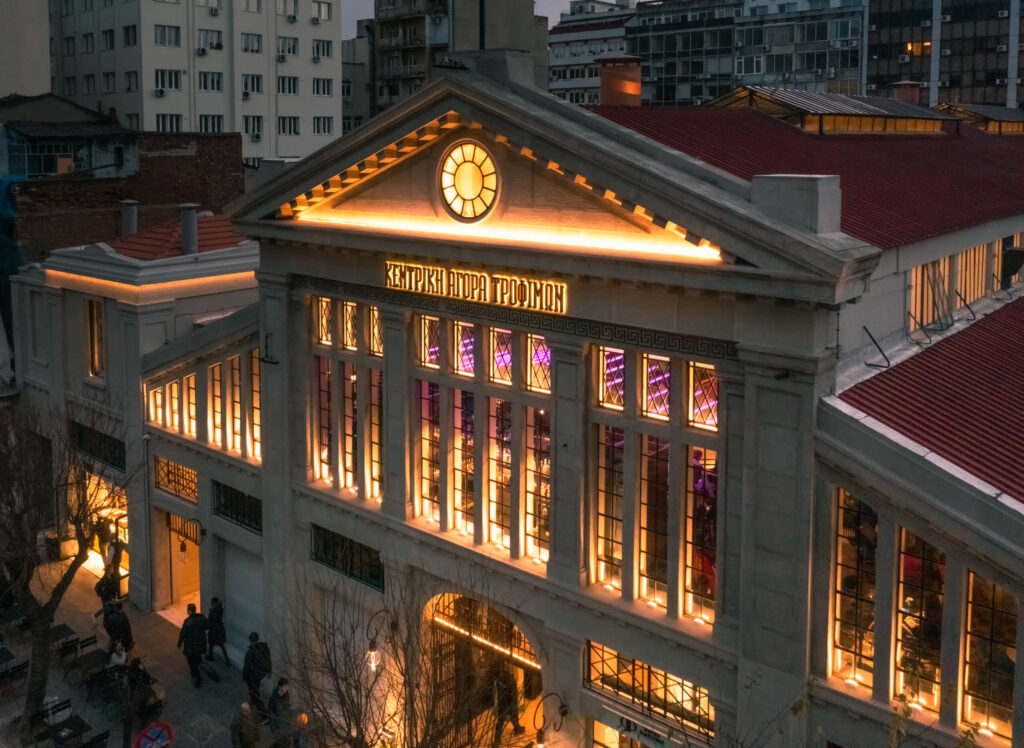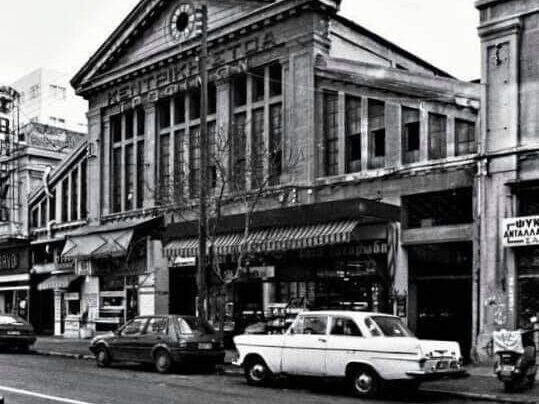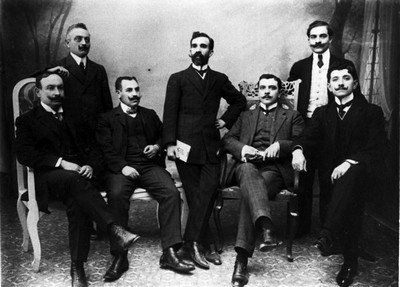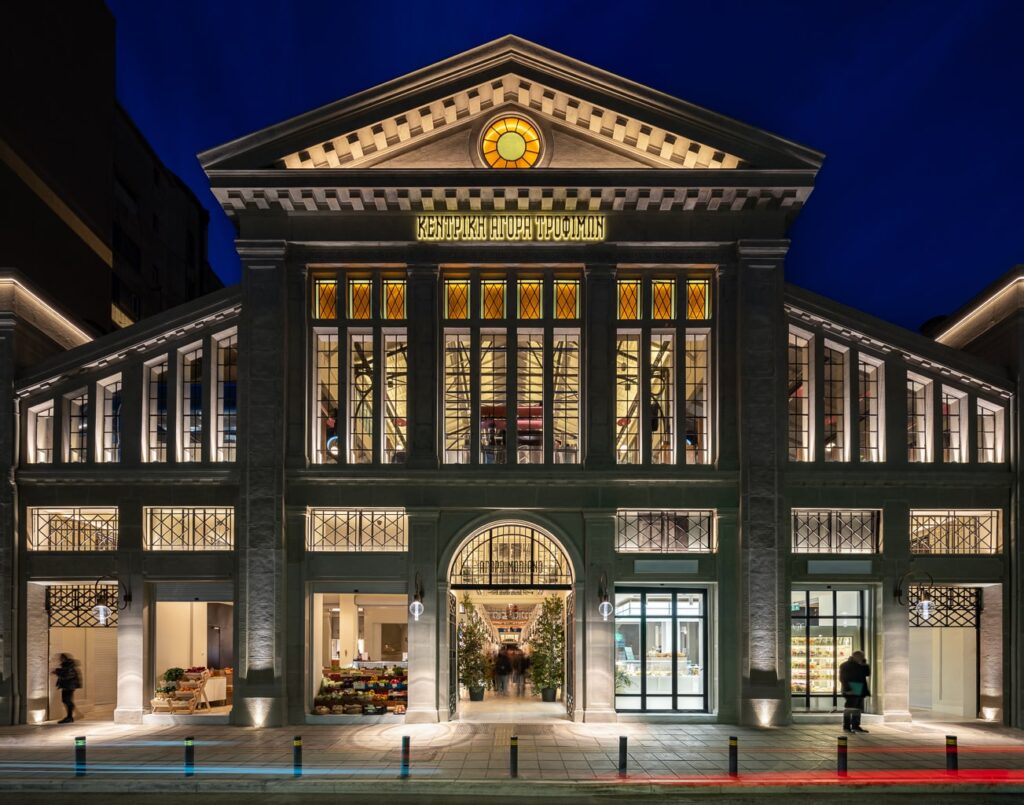Modiano Market, a tapestry of history and culture.

Modiano Market, nestled in the heart of Thessaloniki, Greece, is a vibrant tapestry of history, culture, and commerce.

Named after the renowned Sephardic Jewish family, the Modianos, this bustling market has been a centerpiece of the city’s life for over a century.
The story of Modiano Market begins in the late 19th century when Jewish immigrants from Spain settled in Thessaloniki, then a bustling port city of the Ottoman Empire. The Modiano family, prominent among them, established a market in the city center, laying the foundation for what would become a cherished institution.
HISTORY
1917
Inextricably linked to Thessaloniki’s recent past, the history of the Modiano Market – or “Central Food Market of Thessaloniki” – spans two centuries, including many important chapters.

After the devastating August fire, engineer Eli Modiano and architect J. Oliphant begin designing the Market. The Talmud Torah Synagogue was located on this site, and according to the Hebrard Plan – named after the French architect-archaeologist Ernest Hebrard, who was in charge of the city’s redesign – the creation of bazaars was planned on this location. In fact, the French title of the Market in the plans was “Bazar Central Salonique.”
1925
Eli Modiano constructs an elongated, single-story building with a basement and internal balconies, with a total area of approximately 2,707 sq.m. The Modiano Market becomes the first traditional food market and one of the largest indoor markets in Thessaloniki.

1930
The Market’s opening is accompanied by an imposing celebration that has been a topic of discussion for the whole city for a long time. From the beginning of its operation, it was closely linked both to the history of the Jewish Community and to the operation of the commercial center of Thessaloniki – as it housed the best shops and products of the city.
1983
The Modiano Market is designated as a listed building by the Ministry of Environment and Public Works.
1995
The Modiano Market is classified as a historic monument by the Ministry of Culture as a typical example of a covered market building.
2016
After a constantly declining course – as most of its 144 shops are gradually abandoned – where the Market retains its memories but not its glamor comes its final closing.
2017
With the signing of the contract by the Hellenic State Property Fund in July, Modiano Market officially passes to the Fais Group.
2022
After almost five years of planning, construction works, and rebranding, the Modiano Market is ready to house a next-generation food market concept.

Modiano Market, nestled in the heart of Thessaloniki, Greece, is a vibrant tapestry of history, culture, and commerce.
As the city evolved through the tumultuous events of the 20th century – including the Balkan Wars, World War I, and the Greco-Turkish War – Modiano Market endured, serving as a beacon of resilience amid adversity. The market thrived, becoming a melting pot of cultures, with Greek, Jewish, Turkish, and Balkan influences intertwining within its narrow alleys.
During World War II, Thessaloniki’s Jewish community faced persecution and deportation by the Nazis. The Modianos themselves suffered greatly, with many members of the family perishing in concentration camps. Despite this tragic chapter, the market continued to operate, albeit under the shadow of loss and mourning.
In the post-war years, as Greece rebuilt itself, Modiano Market regained its vitality, serving as a hub for locals and visitors alike. Its labyrinthine lanes were filled with vendors selling everything from fresh produce and spices to clothing and household goods. The air buzzed with the cadence of bargaining and the aroma of traditional Greek cuisine wafted from nearby tavernas.
However, as Thessaloniki modernized and commercial districts expanded, Modiano Market faced challenges. Many traditional markets struggled to compete with supermarkets and shopping malls. Yet, Modiano Market endured, preserved by its unique character and deep-rooted connections to the city’s heritage.
In recent years, efforts to revitalize the market have borne fruit. Local artisans and entrepreneurs have injected new life into its historic precincts, offering handcrafted goods and specialty products. The market has become a cultural hotspot, hosting events such as music concerts, art exhibitions, and food festivals, attracting both locals and tourists seeking an authentic Thessaloniki experience.
Today, Modiano Market stands as a testament to Thessaloniki’s rich tapestry of history and culture. Its weathered facades and cobblestone streets bear witness to the passage of time, while its vibrant atmosphere embodies the resilience and spirit of the city. As visitors wander through its bustling corridors, they are not just shopping for goods; they are immersing themselves in a living legacy, where the past and present converge in a celebration of community and tradition.
Share On Social

